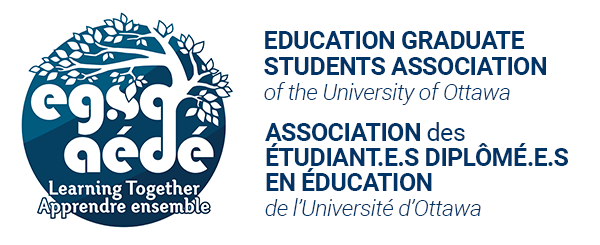La série de conférences étudiantes offre aux étudiant.e.s l’occasion de mettre en pratique leurs techniques de présentation et de partager leurs idées avec leurs collègues. Les étudiant.e.s peuvent pratiquer la présentation pour une conférence à venir, la défense, ou partager d’autres idées (par exemple, méthodologie, épistémologie, cadre théorique) avec leurs collègues.
Les étudiant.e.s sont invité.e.s à faire partie de l’auditoire pour apprendre de leurs pairs et fournir une rétroaction constructive aux présentateurs. Les sessions seront annoncées via le bulletin EGSA-AÉDÉ, la page Facebook et Twitter. Nous avons hâte de vous y voir!
Présentateurs :
13h : Rebecca Hogue
13h 30 : Billie Jane Hermosura
14h : Discussion
Date: le 11 avril 2018 à 13h
Lieu : LMX 477
(Veuillez noter que ces informations sont envoyées uniquement dans la langue dans laquelle elles sont reçues.)
Patient perspectives on health literacy – Learning from ePatient blogs (Rebecca Hogue, PhD Candidate)
Patients who are actively involved in their personal healthcare sometimes self-identify as ePatients, which has been used to describe “individuals who are equipped, enabled, empowered and engaged in their health and health care decisions” (Ferguson, 2009). When defining health literacy, The National Academies of Sciences, Engineering, and Medicine (2004) define health literacy as “the degree to which individuals have the capacity to obtain, process and understand basic health information and services needed to make appropriate health decisions” (p.16). Health literacy has been defined and addressed from the perspective of healthcare professionals and organization, but has not been address from an ePatient perspective. In this presentation, I outline a framework of health literacy that I, as an ePatient, developed throughout treatment for breast cancer. The ePatient health literacy framework helps to elucidate the things that patients of critical illness need in order to learn to live with illness.
Exploring Dietitians’ Perceptions of Leadership Skills: A Pilot Study (Billie Jane Hermosura, PhD student)
Billie Jane explores the use of critical incident technique (CIT), and its feasibility in conducting health workforce research. CIT was developed during World War II by Flanagan (1954) to analyze specific well-defined critical situations. This method continues to be used in different research settings. For example, in health professions research CIT can be used where direct examination of participants can help to better understand their professional roles (Schmidt-Huber, Netzel, & Kiesewetter, 2017). In this pilot study, an explorative design employing CIT will be used to identify dietitians’ perceptions on developing leadership competence in dietetics education.
